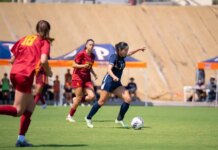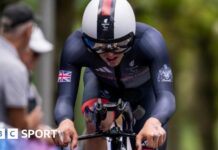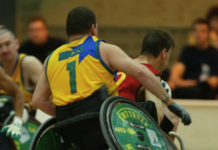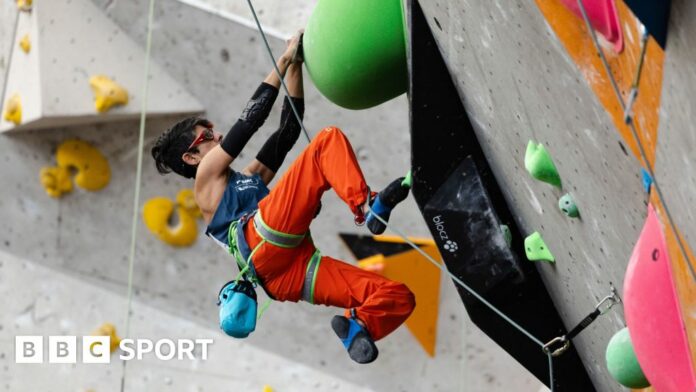By Evie AshtonFreelance journalist
6 December 2023
Image source, Anita Aggarwal
Image caption, Anita Aggarwal is a climbing coach as well as a competitor
At 50 years old, British Para-climbing champion Anita Aggarwal collects national and international medals for fun, but the sport was once a lifeline that helped her get through one of her toughest periods.
Nearly 15 years ago, Aggarwal was a full-time IT trainer for Rolls Royce, living the typical nine-to-five life while enjoying gigs, clubbing and shopping in her spare time.
In 2008, intrigued by a new climbing wall that opened locally in Derby, she and a friend started casual climbing sessions together.
However, Aggarwal had been noticing problems with her eyes, and had been suffering migraines that would last for more than three days.
“I kept tripping over the bins at work. I was getting loads of shaky waves around my peripheral vision,” she says. “I called it a goldfish bowl. My eyes were shaking. I thought ‘this is weird’.”
In February 2009, a doctor told her it was just a headache for which she should take paracetamol.
It was at a music festival that May where matters became far worse.
“I was walking wonky through the tents. I was staggering left and right. I couldn’t walk straight. People thought I was drunk but I hadn’t been drinking,” she explains.
“It was like having a stroke. Everything down the left side stopped.”
Following a lumbar puncture and MRI scan in hospital, Aggarwal was diagnosed with multiple sclerosis (MS), aged 36.
MS is a condition in which the coating protecting the nerves in one’s brain and spinal cord are damaged, causing symptoms affecting how one moves, thinks and feels.
For Aggarwal, the diagnosis was a relief. The hardest part was living with the condition.
“Everybody else got upset,” she says. “I’ve never cried about it. I was like, ‘OK, at least I know what the diagnosis is.'”
In the years that followed, she was forced to come to terms with agonising losses and grieve her previous way of life.
She had to stop working, stopped climbing, her partner left her, she lost weight, lost her independence and she was diagnosed with depression.
“The hardest thing was I lost all my friends because nobody else could deal with it. Nobody else could accept it,” she says.
“I find it hard not being able to go to gigs, not being able to ride a bike or run, not being able to go out clubbing.
“People don’t understand that I can’t just walk down the road. I can walk down it, but I can’t come back.”
In 2016, Aggarwal’s mother encouraged her to return to climbing. It was then that she discovered a community where she finally felt understood – Para-climbing.
Image source, Getty Images
Image caption, Anita Aggarwal (right) after finishing third in the RP2 category at the 2018 Para-climbing World Championships in Innsbruck with France’s Marlene Prat and fellow Briton and winner Hannah Baldwin (centre)
“It has changed my life. If I didn’t have climbing, I don’t know what I’d be doing,” she says.
“A climbing wall is an adult’s playground. We are going on a wall that’s designed for us.”
In her first Para-climbing series competition, she claimed first place in the RP category (limited power, reach and stability). The following year she was invited to the Great Britain development squad and made her international debut.
During this time, she realised that provision of coaching and climbing sessions specifically for children and adults with disabilities was lacking in Derby.
As a result, Aggarwal became a qualified climbing instructor and set up an inclusive coaching business.
Through word of mouth, she has introduced climbing to those with disabilities, people within the LGBTQ+ community and ethnic minority groups around the Midlands.
She explains: “[As a person with disabilities], they know that I can look after them and say, ‘Look, go have a break and come back when you’re ready’.
“You can sit on the mat and talk to somebody and still get a feeling of, ‘I’ve got out of the house, and I’ve managed to do something today. I didn’t climb, but I’ve got to the wall.”
“Their impairment doesn’t necessarily impact how they can climb. They just have to climb differently to solve the problem.”
More recently, Aggarwal’s climbing career has continued to blossom, even in the face of a colon cancer diagnosis in November 2022.
Now with the all-clear, Aggarwal anxiously awaits the International Paralympic Committee’s upcoming decision on whether Para-climbing is included in the Los Angeles 2028 Games, and if it is added to the programme, which sport class will be selected.
She will be 55 in 2028, but Aggarwal is unfazed.
“When you get to my age, you still feel like a 20-year-old,” she says. “My body knows it’s not a 20-year-old, it’s recovering from cancer, it’s dealing with MS, but when you climb you forget about those things.
“I would be gutted not to be in the Paralympics as it would have been something I wanted as a kid.”
The inclusion of Para-climbing in the Paralympics would lead to much-needed increased funding in Great Britain, and, crucially, media coverage and representation.
Climbing’s debut at the Tokyo Olympics in 2021 may have led to an influx of new climbers, but Aggarwal believes the Para-climbing community has not felt this benefit, as disabled athletes were not seen.
“A lot of people don’t even know what Para-climbing is,” she says.
“It would be brilliant for people to see Para-climbers. Especially in RP, we can’t walk forward very long and carry anything, but we can climb higher and better than some people.”
Image source, Anita Aggarwal
Image caption, Aggarwal watches on and advises during a coaching session
Source link : https://www.bbc.co.uk/sport/disability-sport/67611483.amp
Author :
Publish date : 2023-12-06 08:00:00
Copyright for syndicated content belongs to the linked Source.





















































